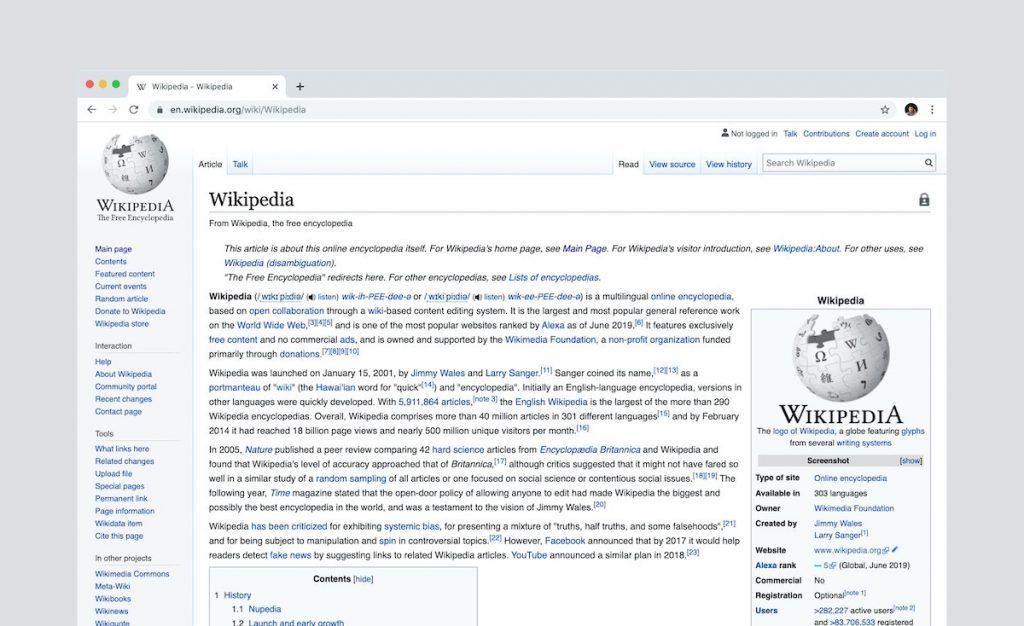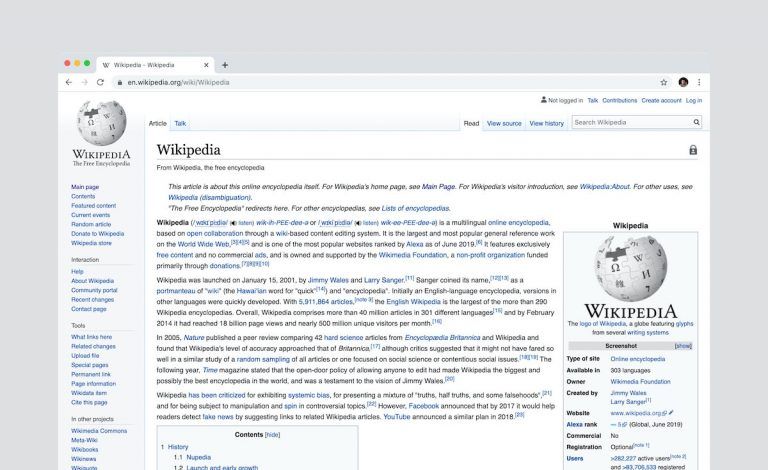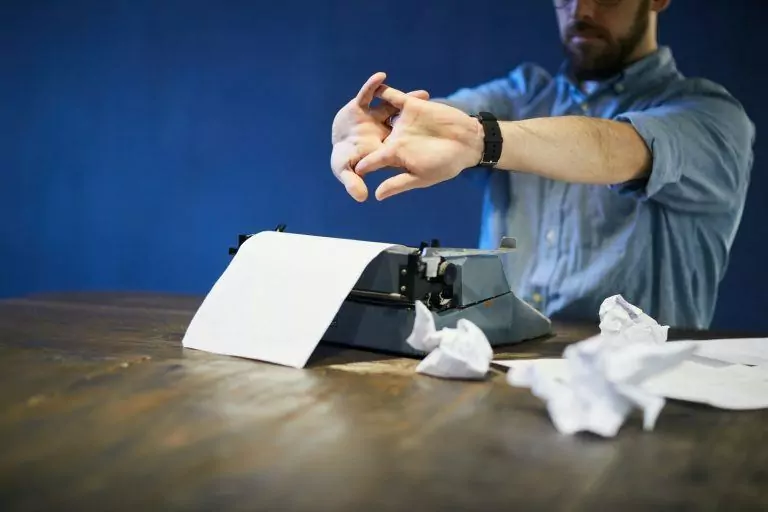3 reasons why you should leave the writing of your Wikipedia article to a professional

This much is clear: Everything that is relevant in the world can be found on Wikipedia in its own entry. Presenting your own Wikipedia article would therefore increase your company's image enormously.
The relevance criteria and guidelines you must meet to publish your own article have already been the subject of previous articles.
As a key point we could capture: An own Wikipedia article is great. But publishing it is more difficult than we thought.
The relevance criteria, guidelines and basic principles that must be observed ensure the seriousness and transparency of Wikipedia as a source of information. At the same time, they make writing and publishing an article more difficult.
In other words, typing a few nice words that make your business look good is not enough. If you violate the criteria and guidelines set by Wikipedia, the article will be deleted.
Ambitious and determined individuals are now (perhaps) motivated to make their way through the jungle of work and conditions to be met on their own.
At this point, you can only wish luck, because the probability that the whole process of writing and publishing will fail is high.
If you want a Wikipedia article to be not only of high quality but also accepted by the community, you should definitely consider the help of a professional copywriter.
Why is that? These three reasons will convince you.
Reason 1: Neutrality and conflicts of interest
Two important aspects to keep in mind when writing a Wikipedia article are neutrality and conflicts of interest.
Since potentially anyone can create and edit a Wikipedia entry, content marketers often think they can simply write a Wikipedia article for their company themselves. However, doing so violates several of Wikipedia's guidelines.
An important basic principle of Wikipedia is neutrality. If you publish an article, you have to be sure that it was written completely neutrally and without any enhancements or embellishments.
Wikipedia sees itself as a serious encyclopedia that is not interested in being part of a marketing strategy for your company. Transparency and objectivity are key requirements for an acceptable article.
Conflicts of interest
If you or your colleagues write a Wikipedia article about your company, neutrality is not guaranteed. As an integral part of the company and therefore also of the subject of the article, it is hardly possible to explain facts without personal and emotional undertones.
And even if you or your employees succeed in doing so, it is still a conflict of interest. As a contributor to the company, you are biased on the subject matter. Your personal interests could determine the content of the article, which violates the basic principle of neutrality.
Editing an existing article in conflict of interest should also be refrained from. The Wikipedia community generally strives to uncover conflicts of interest.
The authors of Wikipedia always work with pseudonyms, which guarantee anonymity. If you work on an article with a conflict of interest, this reduces your anonymity. You may publish information that is only known within the company and cannot be verified by sources. Conclusions about certain persons are easier to trace, which has a negative effect on you and the respectability of your company.
Conflicts of interest in source citations
Neutrality and conflicts of interest refer not only to the writing of the articles, but also to the sources.
The basic principle of neutrality also requires that facts and statements be supported by reliable sources. If one cites one's own literature and other publications as sources in a conflict of interest, they are not considered neutral.
This does not mean that no sources and publications that you have written or published may be cited at all. However, they have to be classified as reliable and added by independent authors or editors. This is how you ensure a neutral point of view when citing sources.
If one considers one's own publications to be adequate evidence, one can refer to them in discussions. Other authors and editors can independently evaluate the sources and add them to the article if necessary. If you add your own sources independently, you will appear unserious and self-promoting in the most unfortunate case.
Reason 2: Time and work
Considering the amount of work involved in the complete process of creating a Wikipedia article, you should allow a lot of time. Leaving aside the aspect of neutrality for the moment, it is still doubtful that you will be able to spend the time necessary to create a high-quality article that will ultimately be accepted.
Taking a step-by-step look at the process from writing to publishing illustrates the amount of work that can be expected.
Step 1: Review of encyclopedic relevance
First, you should check whether your company is of encyclopedic relevance at all. Your company must fulfill at least one of the specified relevance criteria. You must also be able to prove this using reliable sources.
In addition, you should already learn about general guidelines and basic principles for writing a Wikipedia article. In addition, you can already create an account and look at the features yourself, as well as check and review other contributions. This way you will learn to apply the basic principles correctly.
You also want to be found on Wikipedia and have your own article?
Step 2: Collect sources
Before you start actually writing the Wikipedia article, you should find external and reliable evidence that will later prove your facts. This will prevent you from including statements in your text that you cannot prove with sources. Every claim you make about your company must be substantiated.
Facts based on pure experience are not enough. The content of your article must be true and undistorted. You therefore need reliable sources from other parties, which are sometimes hard to find.
Reference books, magazines, other websites, articles, and videos are all ways you can look for evidence. For example, is there a magazine that has reported on your preeminence compared to a competing company? Or have local magazines documented the establishment and evolution of your business?
Such external sources are especially important for the seriousness of your article. Also, any copyrights for text and images must be respected. If you use material with certain licenses without the consent of the copyright holder, your article will be deleted.
Step 3: Writing the article
Once you have fulfilled all the previous conditions, you can start with the actual task.
When writing the article, you should follow a rough structure. First of all, it is important to write an introduction that precisely introduces your company. Then you should describe the history of your company's development. Finally, you should describe important products or services.
Again, your statements must be neutral and factual and must be supported by reliable sources. Especially when describing services: less is more. Modest wording is important here, otherwise your article could give the impression of an advertisement.
Formalities must also be observed when writing the article itself. There are general rules on formatting, citations and the summary of references at the end of the article. It is helpful to look at articles from similar companies as sample templates.
Step 4: Submit for review
If you are sure that you meet all the criteria and can present a factual and qualitative Wikipedia article, it is submitted for review. This process can take up to several weeks.
Your article will be checked and changed during a review. In addition, you will receive feedback on missing or unnecessary content in your article.
Reason 3: Experience
If you are writing a Wikipedia article for the first time, you probably don't have much experience in any of the areas just explained Professional copywriters, on the other hand, do.
Many copywriters offer the professional writing of a Wikipedia article to them. They already have experience with adhering to relevance criteria, guidelines and any other formalities that need to be observed.
Moreover, while writing the article, they take something important that you probably do without: a neutral point of view. If a copywriter writes your Wikipedia article, you avoid a conflict of interest and the neutral point of view is maintained.
Copywriters also have much more experience in knowing which content actually belongs in the article and which information is unnecessary. They also know how to cite sources.
Not to forget stylistics and spelling. Grammatical errors and unclean language give the impression of a dubious company. Also, keep in mind that writing your Wikipedia article is not over once you have published it. On the contrary, your article must be updated as soon as there are new developments or achievements in your company. You should also consider making your article accessible to a wider audience by translating it into several languages and then publishing it.
A professional copywriter helps you to create your dream article
Not only the writing of the Wikipedia article, but also the observance of all criteria and guidelines leads to a lot of work. The individual steps required to publish an article illustrate this.
Therefore, in addition to the daily work, it is more than difficult to spend enough time on all the conditions and requirements, compliance with which is necessary for the publication of an article. You or any of your company's employees are also in a conflict of interest, which is why you should refrain from writing your own article anyway.
Besides, not everyone has the talent to write meaningful and good texts.
This is where copywriters come in. They not only ensure that all criteria and guidelines are met, but also that your Wikipedia article "survives" the critical Wikipedia community. By writing in neutral and clean language, they provide you with its high quality article. This minimizes the likelihood that your article will be deleted for violating the guidelines.
So if, before writing the Wikipedia article, you see yourself caught between the decision of sacrificing financial resources (=copywriter) or time resources (=writing yourself), you should always keep the desired end result in mind.
Not only does a professional copywriter help you get this faster, but your own Wikipedia article may even end up being much better than you could have hoped for in your wildest dreams.






